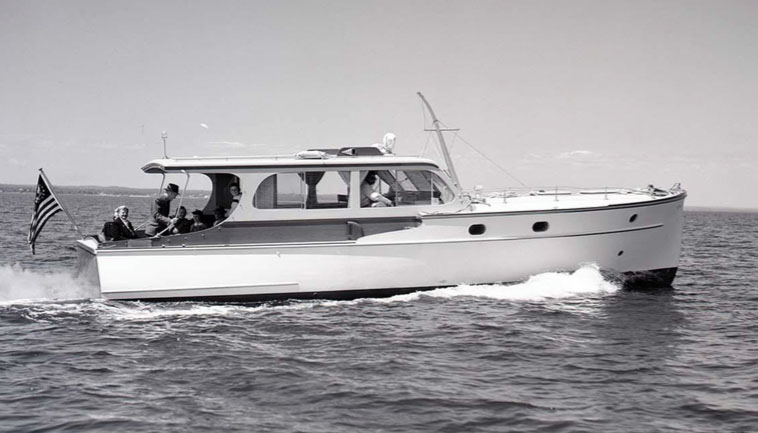
For the most part my father was extremely logical, even to a point where I felt his pragmatism was excessive. As a dreamy poet-to-be I often deemed logic a drag. But every now and then my father held views I found insane, and one such view was that he preferred sailboats to powerboats. I didn’t see the sense in being dependent on anything so fickle as the wind. When the wind wasn’t capsizing you it was leaving you becalmed. However his dislike of motorboats approached racism. Even when we were helplessly becalmed he would look down a sneering nose at a cabin cruiser puttering cheerfully past, and contemptuously mutter, “stinkpot.”
I had to admit he had a point, for when a boat passed upwind it really did stink. Also it made a racket, and spoiled the experience of being amidst all the sloshing and gurgling sounds of winds and waves. However I disliked all the ropes and knots involved with sailing, and especially all the jargon. It seemed silly to say “ready about” rather “get ready to turn”, and “now we’re turning” made far more sense than “hard to lee”, but my father insisted on my learning a whole new vocabulary. It didn’t seem fair, for school was suppose to be over for the summer, and I preferred fishing in my happy harbor to that harbor becoming a classroom, and I pouted when I should have been grateful my father was doting on me. I was eventually faced with a dilemma, for I loved the ocean, but wound up disliking both sailboats and stinkpots.
My solution to this dilemma was a row boat. It wasn’t a loud stinkpot, yet I could go straight upwind like a stinkpot. I rowed all over the place, and, being a boy, eventually discovered a rowboat was like a stinkpot in another way. I could run out of gas. This occurred when both wind and tide were against me, and I extracted myself from a few dilemmas my mother never heard about, for I knew how she fretted when my father and brothers bragged about their exploits aboard various small sailboats.
In the years since none of us drowned, and I have learned that even aboard stinkpots people have exploits. In fact danger seems to be the one thing which rowboats, sailboats and stinkpots have in common.
My mother could never understand why anyone would expose themselves to such danger when they could sit in the sun safely ashore, happily chain-smoking dangerous cigarettes and reading an Agatha Christie novel about people in danger. I thought to myself she was a hypocrite, but never recall attempting to explain to her what was so wonderful about going to sea. (She may have eventually learned, for her third marriage was with a career Navy man, and her ashes were eventually buried at sea.) But this is about my father.
As I now sit ashore by lakes far from the sea, an old man without the stamina to row I once had, I like to recall my father when I see a sailboat becalmed out on the water, going nowhere as people driving jet-skis rocket joyously past. I just know, if he was aboard such a becalmed boat (and could imagine the phenomenon of jet-skis), he’d be muttering, “stinkpot”.
I find myself wondering what he found so virtuous about being dependent upon something you couldn’t control: The fickle wind. Within the answer to that question is a sonnet:
. STINKPOT SONNET
Long ago men knew, when pirates seized a ship
And raised its sails, the boat went nowhere
Without the wind: Wind no pirate could grip
With greedy hands. But now men do not care
So much for wind, and weak minds fail to grasp
Power still comes from beyond their control.
Stalin saw it, when the stroke made him gasp
With bulging eyes. Deep down in mankind’s soul
Is knowledge our sails are our mortal lungs,
And without wind in those lungs we go nowhere,
Yet ignorance lifts ladders without rungs
Towards their tops; fools cruise upstream unaware
They’ll be in rapids when gas tanks empty.
I shake my head. Such a fate doesn’t tempt me.

